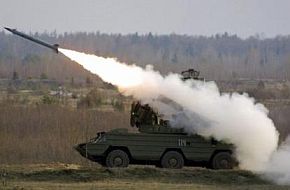Baltic States – CIS, EU – Baltic States, Latvia, Legislation, Russia
International Internet Magazine. Baltic States news & analytics
Thursday, 18.12.2025, 22:42
Poland and Baltic States voice alarm at Russia missile plans
 Print version
Print version |
|---|
"Plans to deploy "Iskander-M" missiles in the Kaliningrad district are disturbing and Poland has said so many times," its foreign ministry said in a statement.
Warsaw said it had received no official word from Moscow about the deployment, which a Russian defense ministry spokesman confirmed on Monday.
"This is a matter for NATO and we can expect possible consultations and action (...) at the NATO and EU level," it added.
"It is clear that it is alarming news as it is one of the arguments changing balance of powers in our region," Latvia's Defense Minister Artis Pabriks said on Monday.
"It does not change the balance of power between NATO and Russia, but it changes balance of power in the region. It threatens several Baltic cities," he added.
He was echoed by Estonia and Lithuania whose defense ministers termed the move both "alarming" and "cause for concern".
The United States has also voiced its concerns to Russia over plans to move nuclear-capable missiles close to the borders of neighboring states, a U.S. official said Monday.
"We've urged Russia to take no steps to destabilize the region," State Department deputy spokeswoman Marie Harf said, adding the U.S. had also passed on to Moscow its neighbors' concerns at the plans to deploy "Iskander-M" missiles in the Kaliningrad area. "We certainly know the countries in the neighborhood have expressed concerns over it, and we'll keep talking to them about it," Harf said.
The Russian deployment comes in response to the planned U.S.-led deployment of a disputed air defense shield. The advanced version of the Russian missile has a range of 500 kilometers and could potentially be used to take out ground-based radar and interceptors of the new NATO shield.
The Kremlin warned in 2011 that it could station the short- and medium-range ballistic missiles along the European Union's eastern frontier in response to NATO's missile defense program.
Both the United States and the Western military alliance have argued that the shield is not aimed at Russia but is designed to protect the West from potential threats from so-called "rogue states". But Moscow fears the system – whose components include missile-positioning satellites – may one day be turned into an offensive weapon that targets Russian soil.
The Kremlin also believes the shield could in the future be expanded to a point that makes Russia's own vast nuclear arsenal ineffective.








 «The Baltic Course» Is Sold and Stays in Business!
«The Baltic Course» Is Sold and Stays in Business!

